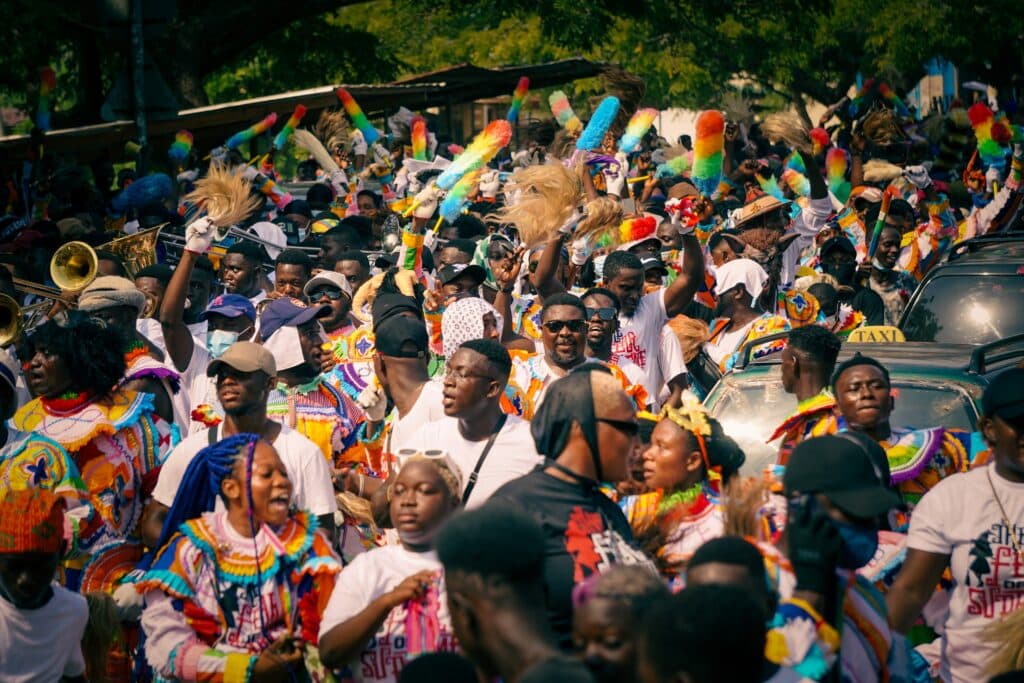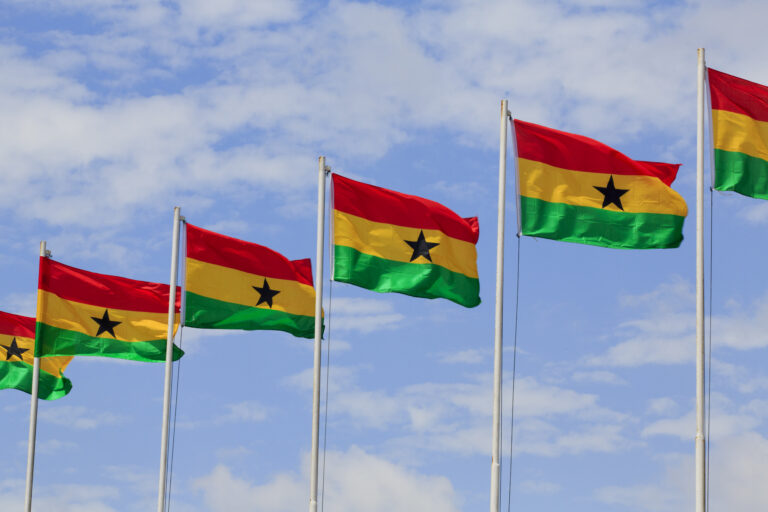Has the thought of moving to Ghana crossed your mind? Are you relocating for work, study, or lifestyle to this West African nation? Whatever your reasons, this guide has you covered.
Though Ghana’s expat communities include many nationalities, Americans are particularly well-represented. Four hundred years after the first enslaved Africans arrived in the U.S., Ghana launched “Year of Return, Ghana 2019,” a program to encourage the descendants of former slaves to return to Africa as tourists or prospective residents. Since then, 5,000 Americans have visited Ghana and chosen to stay.
If you’re considering moving to Ghana, this guide will introduce you to the immigration process and important facts about the country to help you prepare.
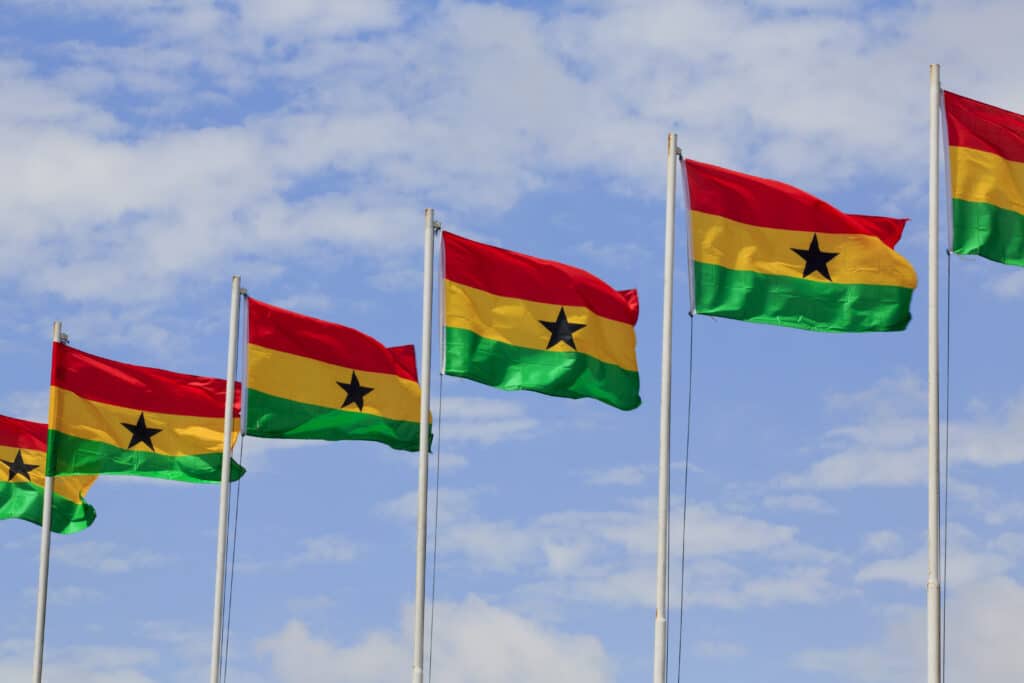
A brief overview of Ghana
Ghana is in West Africa, bordering the Gulf of Guinea and the Atlantic Ocean to the south, the Ivory Coast to the west, Burkina Faso to the north, and Togo to the east.
- Size: 92,098 square miles (238,533 square kilometers)
- Capital: Accra
- Major cities: Kumasi, Tamale, Takoradi, Cape Coast
- Population: 31.4 million people
- Foreign-born population: roughly 1.5% of total
- Official language: English, Akan is the largest native language
- Demographics: 47.5% Akan, 17% Dagbani, 14% Ewe, 7% Ga-Adangbe, 6% Gurma, 4% Guan, 2.5% Gurunsi, 1% Bissa
Ghana is well known for its beautiful landscapes, and about 70% of the land is used for agricultural purposes. Some agricultural areas have spread into the country’s lush forests, which cover about 30% of Ghana’s total landmass.
Can a U.S. or Canadian citizen move to Ghana?
U.S. and Canadian citizens do have the opportunity to move to Ghana, provided they go through the immigration process and their applications are approved.
What are the requirements to move to Ghana?
To enter Ghana, you must hold either dual citizenship status or an entry visa. If you plan to work in the country, you will also need a work permit.
How do you get Ghanaian dual citizenship?
Americans and Canadians that can prove they are of Ghanaian nationality can apply for dual citizenship to enter the country. To prove this, you can submit either:
- Your parent’s birth certificate, Ghanaian voter ID card, or Ghanaian passport
- Names and addresses of two relatives who live in Ghana
Dual citizenship also requires a photocopy of a U.S. or Canadian naturalization certificate or a U.S. or Canadian passport and the completion of an application. The form can be obtained from a Ghanaian embassy or consulate in the U.S. or Canada. You can also request it by mail. When you submit the application, you’ll need to pay a fee of $200.
How do you get a visa to move to Ghana?
Everyone else who wishes to move to Ghana will need to obtain an entry visa. Americans and Canadians will be granted entry visas fairly easily, with these requirements.
- Proof of financial means: The Ghanaian government may ask for proof of bank and investment account statements to show you have adequate savings to live off, or require you to obtain a job and acquire a work permit before you can enter.
- No criminal record: The Ghanaian government uses the term “undesirable” to include anyone charged with a felony that involved injury to another. A background check will be performed before your visa application is approved.
- Clean bill of health: Health authorities may bar someone from receiving a visa with a communicable disease like a sexually transmitted infection or another infectious disease or illness.
You can apply for an entry visa online or at a Ghanaian Embassy or Consulate. At the time of this writing, there is an application fee of $60 for a single-entry visa with regular processing, which takes 15–20 business days. The application fee is $100 with 7-day expedited processing.
How do you get a work permit in Ghana?
If you need a work permit, follow these steps:
- Obtain employment from a company in Ghana that is permitted to hire non-Ghanaian citizens
- Contact or visit a Ghanaian embassy or consulate to apply for a work permit
- Submit your resume, copies of any diplomas or degrees you have earned, and proof of employment (usually a letter from the company on their official letterhead)
Your prospective employer will also need to submit information, such as their registration information, tax clearance certificate, and financial reports. Normally, employers submit this information to the government directly.
The Ghanaian government usually assesses a fee for work permit applications, but the amount varies and may be paid by your prospective employer.
Processing time is usually about 2 weeks.
Can you live in Ghana permanently?
With a work permit, a foreigner can typically stay in Ghana for 6 months to 1 year. At the end of that period, you’ll need to apply to renew the permit and remain in the country. After living in the country for five years, you can apply to become a Ghanaian citizen.
Individuals who hold dual citizenship can remain permanently in Ghana.
How much money do you need to move to Ghana?
The cost of flying or driving to Ghana depends on where your trip begins. While the cost of living is low as compared to many countries in Europe and North America, it can be quite expensive to travel there.
International moving companies charge for the cost of shipping by container, which includes inspection and customs’ fees. As a result, the cost can run into thousands of dollars.
Expat forums like ExpatExchange will have up-to-date information from others about the cost of moving, as well as recommendations. In general, the amount you’ll pay will depend on the distance you travel and the total weight and size of what needs to be moved.
Once you arrive in the country, factor in the cost of initial accommodation in a hotel or hostel as you search for a residence.
How much monthly income do you need to live in Ghana?
A comfortable monthly income amount in Ghana depends on your location in the country. The estimated monthly living costs for a family of four in the capital city of Accra, Ghana, was $1,698 without rent in August 2022. For a single person, the monthly cost of living was $471.77.
In the city center, the average monthly rent was around $834 for a one-bedroom apartment or $2,012 for a three-bedroom apartment. The cost of living in other areas of Ghana may be lower.
The cedi is the unit of currency used in Ghana. As of August 2022, one cedi was worth about $0.12 U.S. dollars.
What type of government does Ghana have?
Ghana is a republic with a single parliamentary house, but it contains multiple political parties. Members of parliament are selected through local voting that takes place once every four years.
A president elected through a two-round voting system serves as the head of state and has a four-year term. The country’s supreme court has the final say on legal matters. Judges are appointed by the president. High judges hold their positions until the age of 70, but they can retire as early as 60.
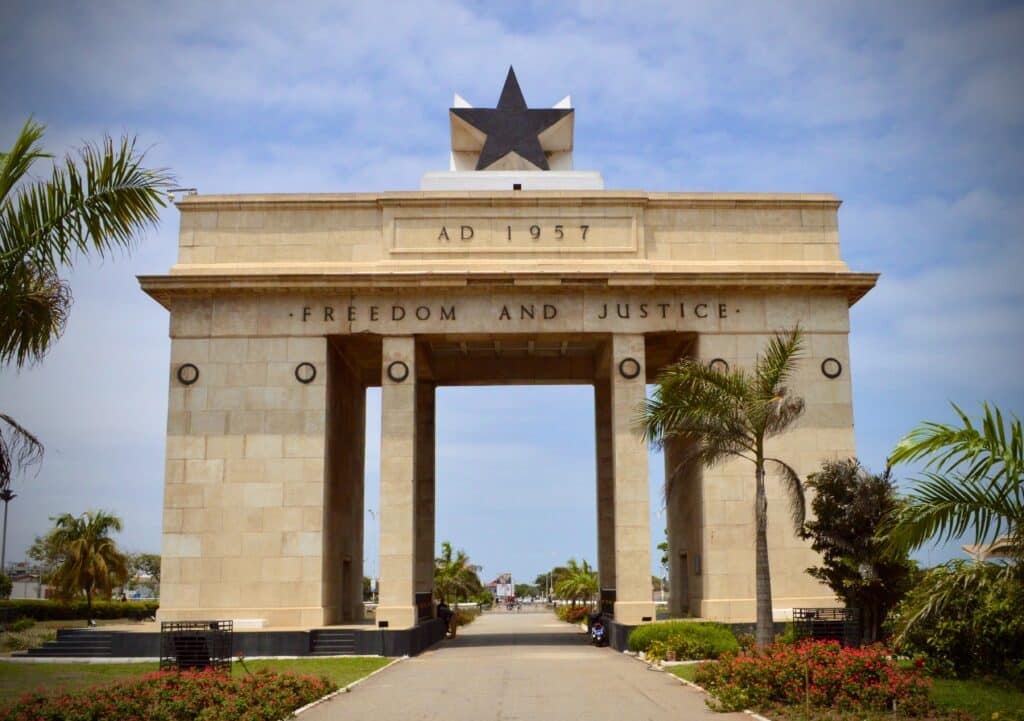
Is there a U.S. embassy in Ghana?
Yes, there is a U.S. embassy in Ghana. It is located in the capital city of Accra. The High Commission of Canada also has an office located in Accra.
Is Ghana a good place for North American expats?
Ghana does have some benefits for North American expats. The cost of living is substantially lower than in many major U.S. cities. The weather is also warm year-round.
However, there are also some drawbacks to living in the country, such as the prevalence of crime and civil unrest in some areas.
The U.S. State Department warns that violent crimes like carjackings and muggings do occur in urban areas, particularly in isolated sections of cities at night. Also, civil unrest in Bono East, Bono, Savannah, Northern, North East, and the Upper East regions of the country could make conditions unsafe for expats there.
What is the cost of living like in Ghana?
Generally, Ghanaians enjoy a lower cost of living than North Americans. The capital city of Accra is about 68% less expensive than New York City, and rent is roughly 82% lower.
What is the education system like in Ghana?
Compared to many other African countries, Ghana has a more robust education system. The Ministry of Education oversees the public school system, which is modeled after the educational system in the UK.
All children in Ghana must attend school through the ninth grade. Secondary school is available, but not mandatory. There are also private schools in the country. In 2018, 28% of Ghanaian elementary school students attended private schools.
Ghana is also home to numerous colleges and universities, and enrollment has increased dramatically over the last 20 years. In fact, enrollment doubled between 2009–2015. Universities in Ghana grant bachelor’s degrees, postgraduate diplomas, master’s degrees, and doctoral degrees like U.S. and Canadian post-secondary institutions.
What is the healthcare system like in Ghana?
Ghana’s healthcare system generally doesn’t make it onto lists of the best healthcare systems in the world. A little more than two-thirds of the population has healthcare coverage, either through the National Health Insurance Scheme (NHIS) or private health insurance plans.
Most people in Ghana receive treatment and care through facilities operated by the government through the Ministry of Health and the Ghana Health Services. These facilities include health posts in rural areas, regional centers and clinics, district and regional hospitals, and large hospitals in large urban centers.
What is the climate/weather like in Ghana?
Ghana has a tropical monsoon climate. Northern Ghana has a rainy season that lasts from May to September. In the south, there are two rainy seasons: April to July and September to November. The annual mean temperature throughout most of the country is 78–84 °F (26–29 °C), and the weather is typically humid.
What is the quality of life in Ghana?
Ghana ranked 111 in the 2022 World Happiness Report, significantly lower than Canada and the U.S., which ranked 15th and 16th, respectively. The study ranked the country’s economic prosperity and freedom to make life choices higher than many other African nations, but poverty rates and a lack of strong social support systems put Ghana behind the U.S. and Canada. However, Ghana was shown to have a much lower perception of corruption among public officials than these two countries.
Can I get a driver’s license in Ghana?
Yes, Americans and Canadians can get driver’s licenses in Ghana. Cars are used more than public transportation. The DVLA handles foreign driver’s license conversions in Ghana.
Other transportation options in Ghana include:
- Public buses: these are operated by the State Transportation Corporation
- Taxis and ride-sharing: these are available in Accra and major cities
- Tro tros: these are private mini buses that transport small groups of people; the Trufi Association has an app to help you find them
Is it easy for Americans and Canadians to find a job in Ghana?
Ghana’s economy is growing rapidly and constantly creating job opportunities. However, the government limits the number of non-Ghanaian people who can work in many fields, so competition for jobs is often high among expats. Many immigrants work in the service industry or teach English.
Does Ghana offer digital nomad visas?
Digital nomad visas allow foreigners to move to a country and work remotely in their home country. As of this writing, Ghana does not offer a nomad visa program.
What are some things to do in Ghana? Exploring your new home
Some top tourist attractions in Ghana include:
- Aburi Botanical Gardens
- Kwame Nkrumah Memorial Park
- Accra Mall
- Osu/Christiansborg Castle
- Artists Alliance Gallery
Ghana also boasts beautiful beaches, such as Bojo Beach and Labadi Pleasure Beach.
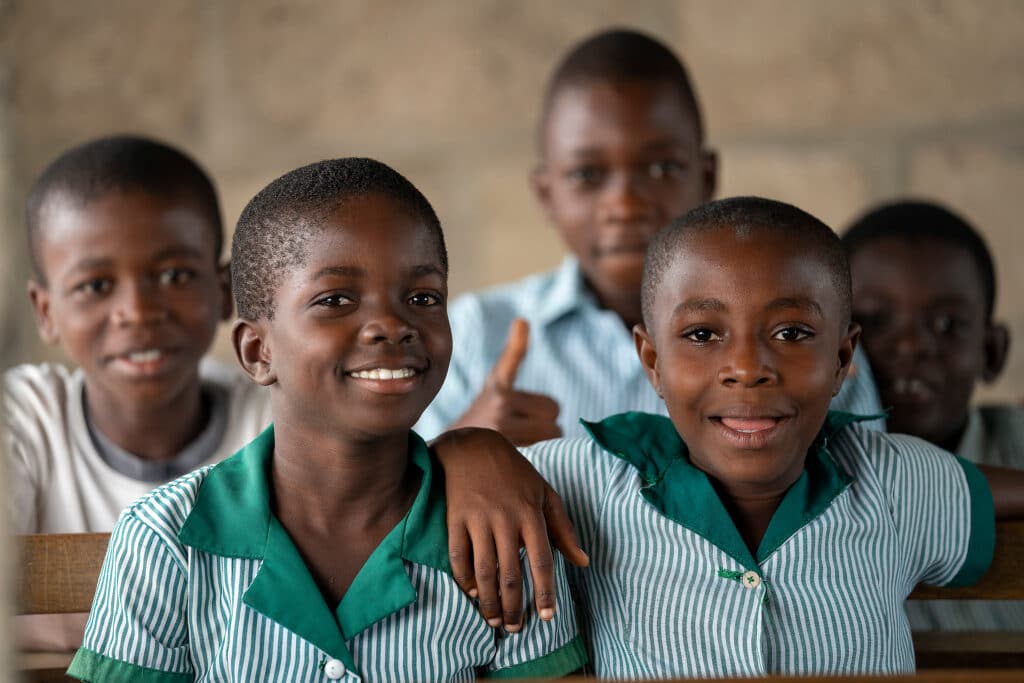
Ghanian culture: what to know
Ghana has many customs. Some important ones to know include:
- Using the phrase “you are invited”: Saying this to someone indicates that they are welcome to have some of what you’re eating. Sharing food is considered an act of kindness and generosity.
- Not using your left hand: Shaking someone’s hand, waving to them, or handing them something with your left hand is considered an insult.
- The unimportance of birthdays and age: Ghanaians don’t place a lot of emphasis on age and don’t tend to celebrate birthdays. In some parts of the country, birthdays aren’t documented. People normally don’t ask, “how old are you?”
- New Year celebrations: On the New Year, many Ghanaians attend Cross Over church services. In recent years, these religious observances have become more important than Christmas.
What are the best places to live in Ghana?
The best places to live in Ghana depend on your age, marital status, lifestyle, and personal preferences.
For retirees
Travel Noire named Kumasi, Ghana, one of the best cities for retirees to live in Africa. Cost of living in the city is generally low, and there are major hospitals in the area. In addition, the city is home to museums, markets, and forest reserves, so there is plenty to do.
For families
Families moving to Ghana may wish to settle in one of these sections of Accra:
- Airport Residential Area: Although rents tend to be pricey, this area is home to good schools and hospitals. Many foreign countries have their embassies here, and there are shopping malls, banks, restaurants, and service businesses as well.
- Cantonments: This area is home to many gated communities as well as the Ghana International School, a prestigious private elementary and secondary day school that is popular among expats.
- Roman Ridge: Families looking for more affordable housing who wish to be away from the hustle and bustle of the city center may prefer the Roman Ridge. The area is quieter than the Airport Residential Area and the Cantonments, and it is home primarily to corporate offices.
For young singles
The Osu neighborhood of Accra is one of the most popular places for young singles to live. It is home to much of the nightlife in Accra and has affordable apartments where many expats live. The area is also home to many restaurants, bars, clubs, and stores.
How to find a place to live in Ghana
Consider working with a real estate agent to find an apartment in Ghana. An expert can provide you with individualized advice about which area is best for you.
Alternatively, you can use a site like Realtor.com International to search for rentals. Facebook groups, WhatsApp groups, and other expatriate forums can be a rich source of information for finding housing.
How to set up a bank account in Ghana
To make it easier to send money to Ghana and make purchases in the country, you’ll likely want to open a bank account. While you can get cash from an ATM with your home country debit card, you’ll need the convenience of local banking for your permanent residency.
There are 32 private banks in Ghana to choose from, including:
Remitly is a trusted app for transferring money between accounts in your home country and your Ghanian bank. With international money transfers, your U.S. dollars will automatically turn into cedis that you can use electronically or withdraw from an ATM.
